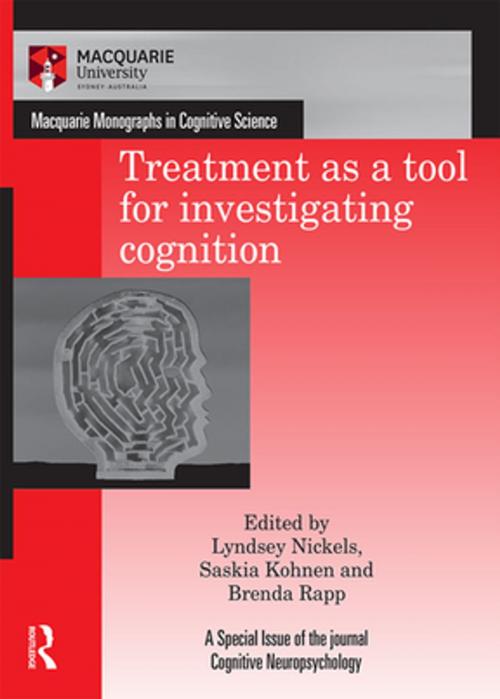Treatment as a tool for investigating cognition
Nonfiction, Health & Well Being, Psychology, Cognitive Psychology| Author: | ISBN: | 9781317219330 | |
| Publisher: | Taylor and Francis | Publication: | February 5, 2018 |
| Imprint: | Psychology Press | Language: | English |
| Author: | |
| ISBN: | 9781317219330 |
| Publisher: | Taylor and Francis |
| Publication: | February 5, 2018 |
| Imprint: | Psychology Press |
| Language: | English |
Cognitive neuropsychological research studies of people with cognitive deficits have typically been directed either at investigating methods of intervention, or at furthering our understanding of normal and impaired cognition.
This book reports on research that combines these goals, using studies that use intervention as a ‘tool’ for investigating hypotheses about the functioning of the human cognitive system. The introductory chapter discusses some of the unique and more general difficulties that this approach faces, while the five reports describe intervention studies with children and adults with cognitive impairments – studies which investigate current theories of cognition. The studies demonstrate that the use of intervention to study cognition is a promising and valuable methodology.
Aiming to promote wider use of these combined methods, this book makes it clear that while the approach faces various methodological and interpretative challenges, it has the advantage of providing advances on issues of theory while, at the same time providing treatment to participants, and bringing together what have been largely separate research traditions. This book was originally published as a special issue of Cognitive Neuropsychology.
Cognitive neuropsychological research studies of people with cognitive deficits have typically been directed either at investigating methods of intervention, or at furthering our understanding of normal and impaired cognition.
This book reports on research that combines these goals, using studies that use intervention as a ‘tool’ for investigating hypotheses about the functioning of the human cognitive system. The introductory chapter discusses some of the unique and more general difficulties that this approach faces, while the five reports describe intervention studies with children and adults with cognitive impairments – studies which investigate current theories of cognition. The studies demonstrate that the use of intervention to study cognition is a promising and valuable methodology.
Aiming to promote wider use of these combined methods, this book makes it clear that while the approach faces various methodological and interpretative challenges, it has the advantage of providing advances on issues of theory while, at the same time providing treatment to participants, and bringing together what have been largely separate research traditions. This book was originally published as a special issue of Cognitive Neuropsychology.















